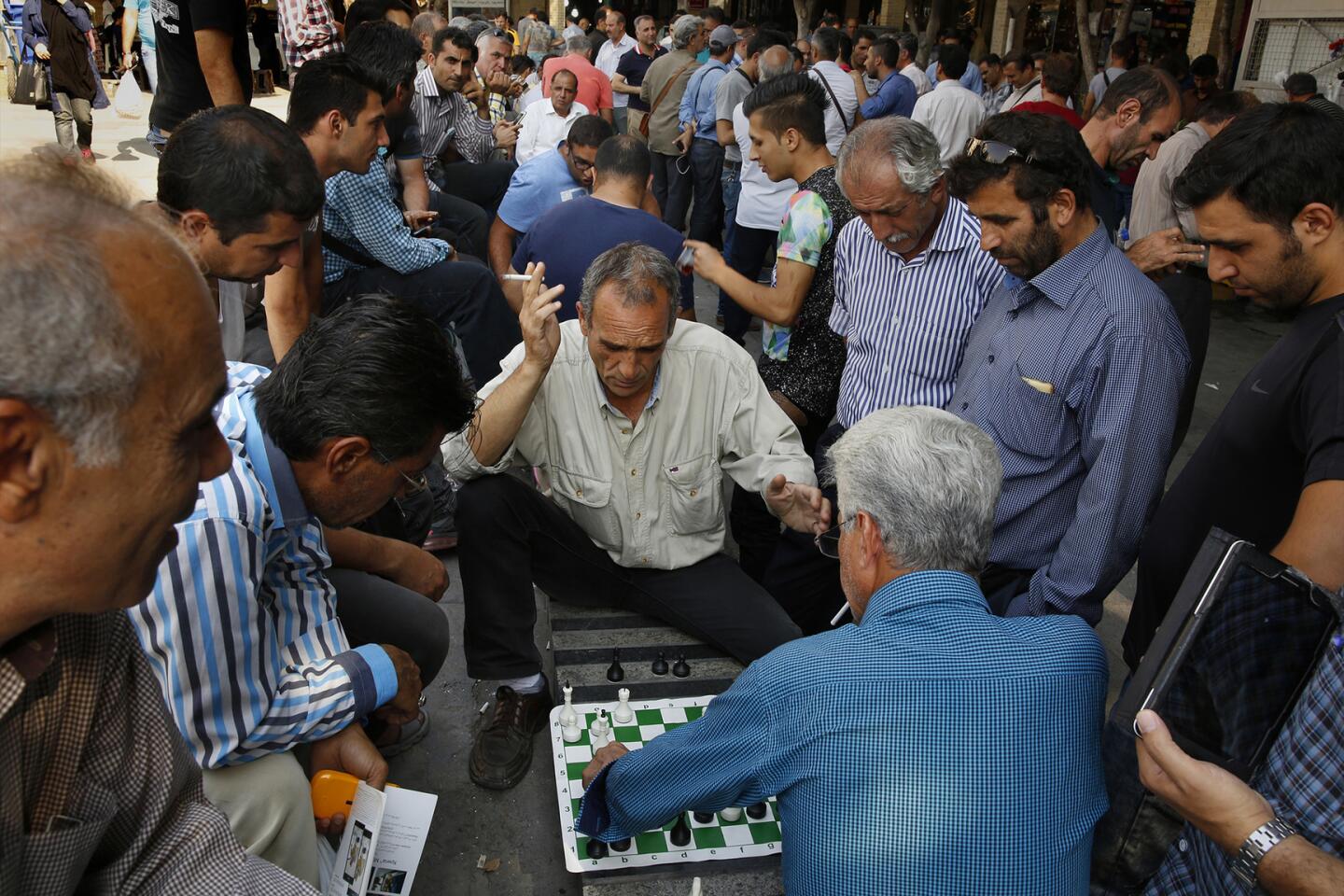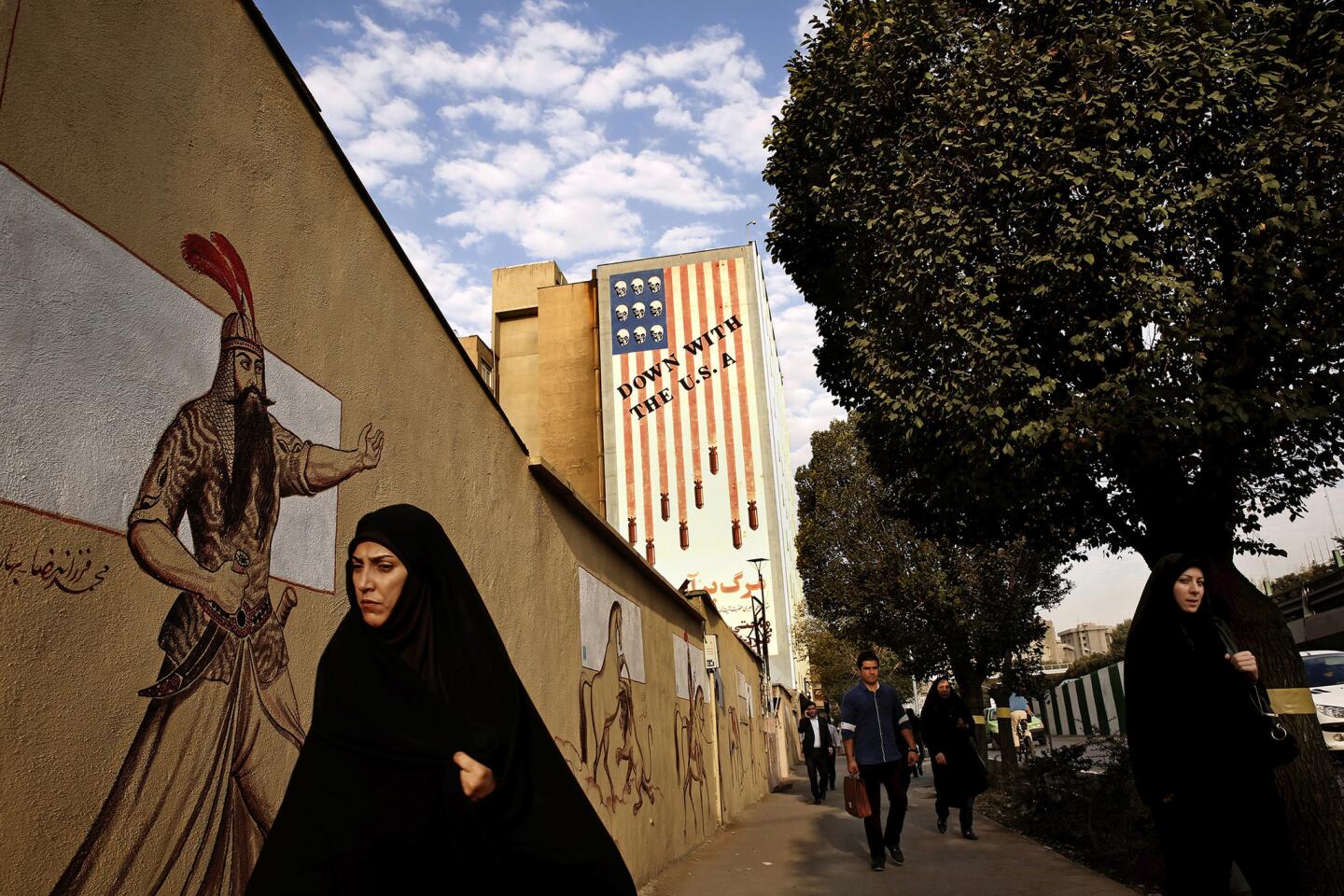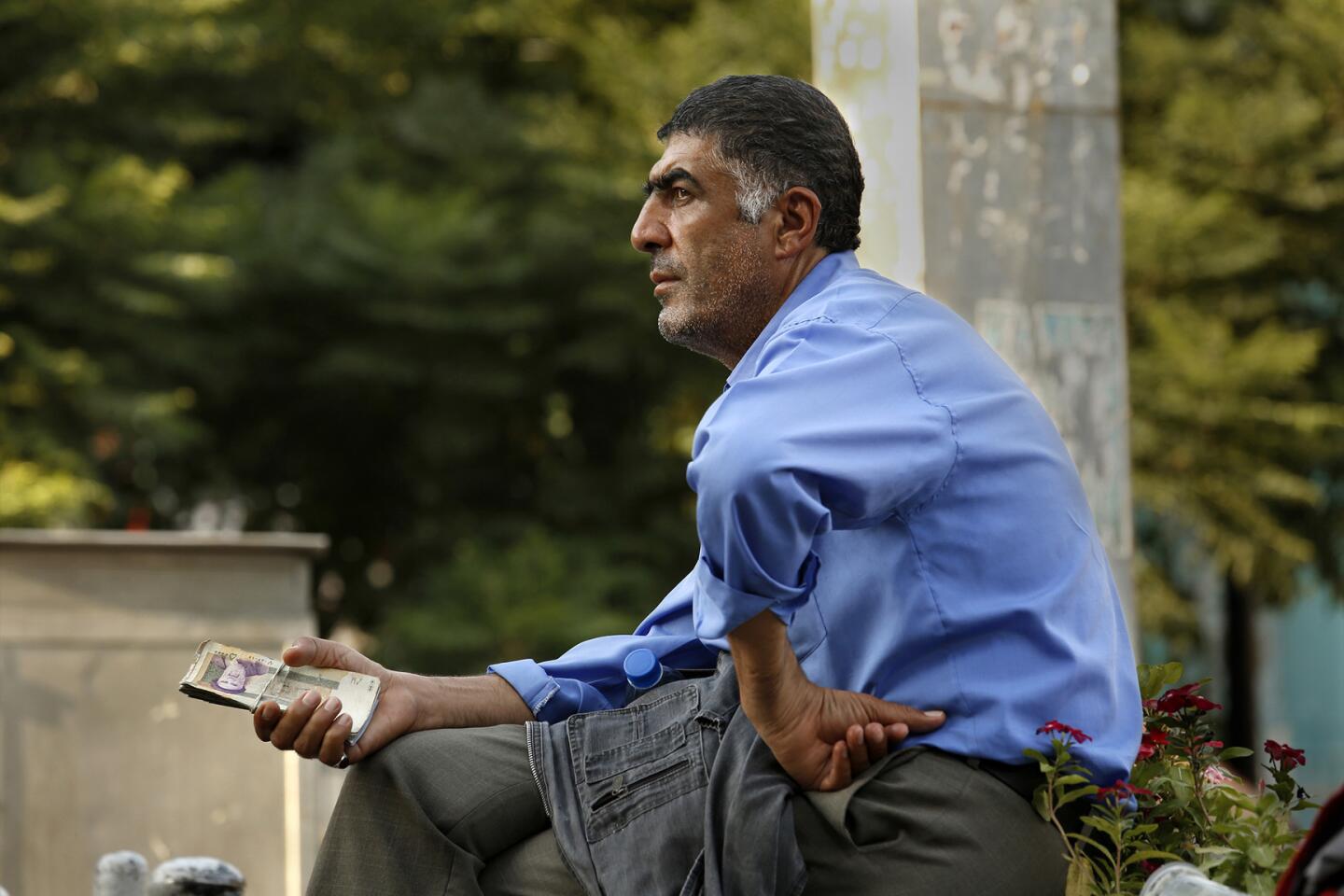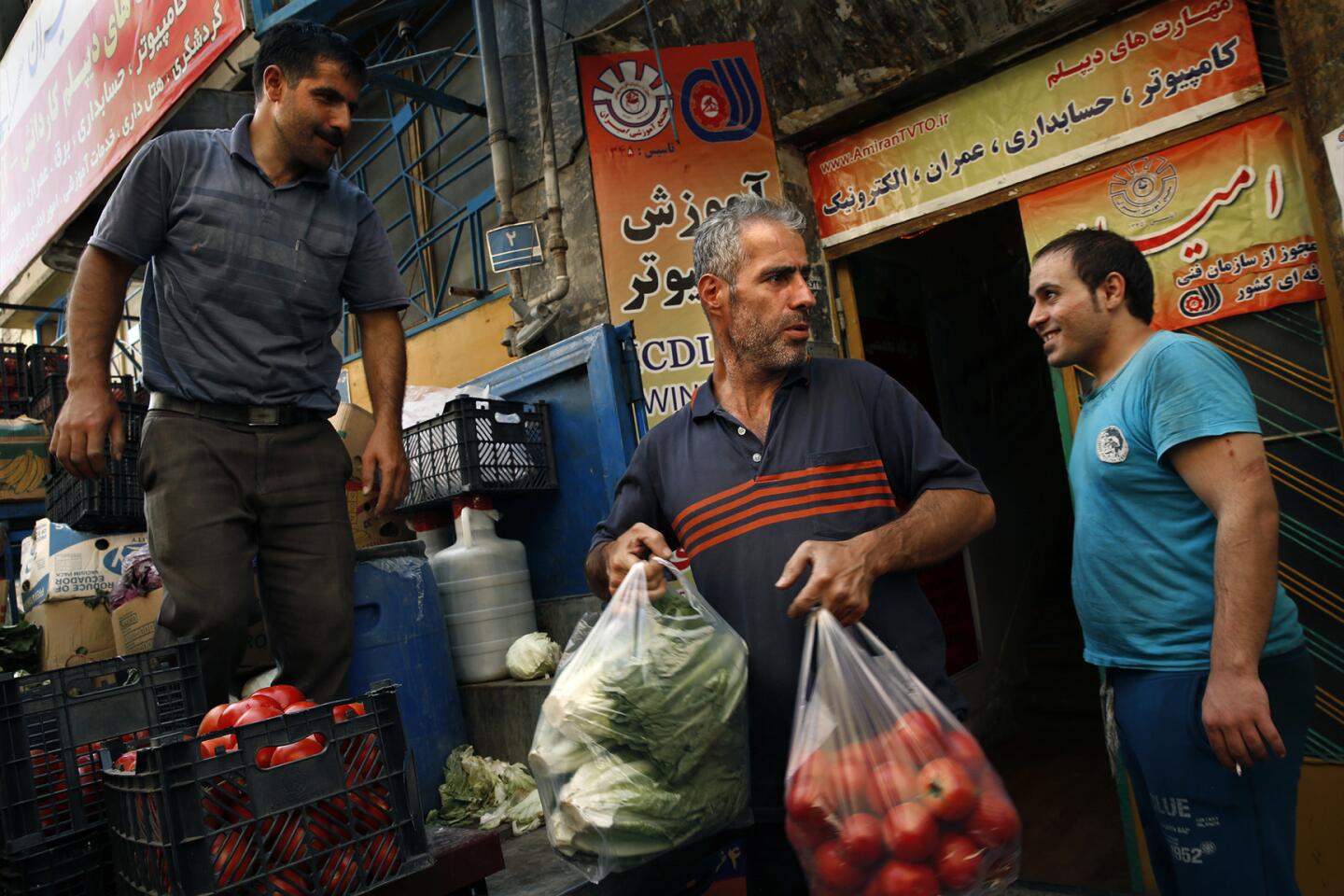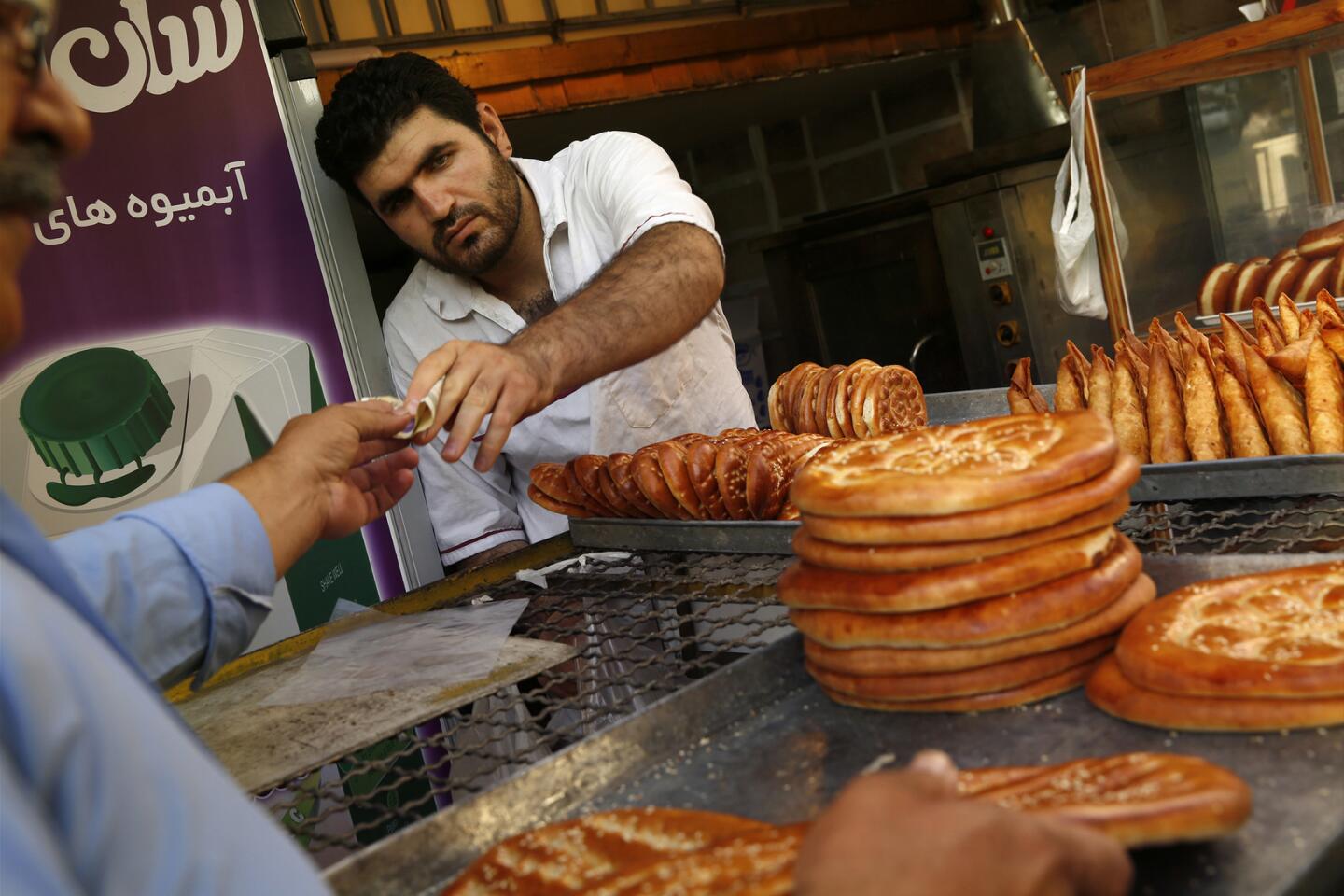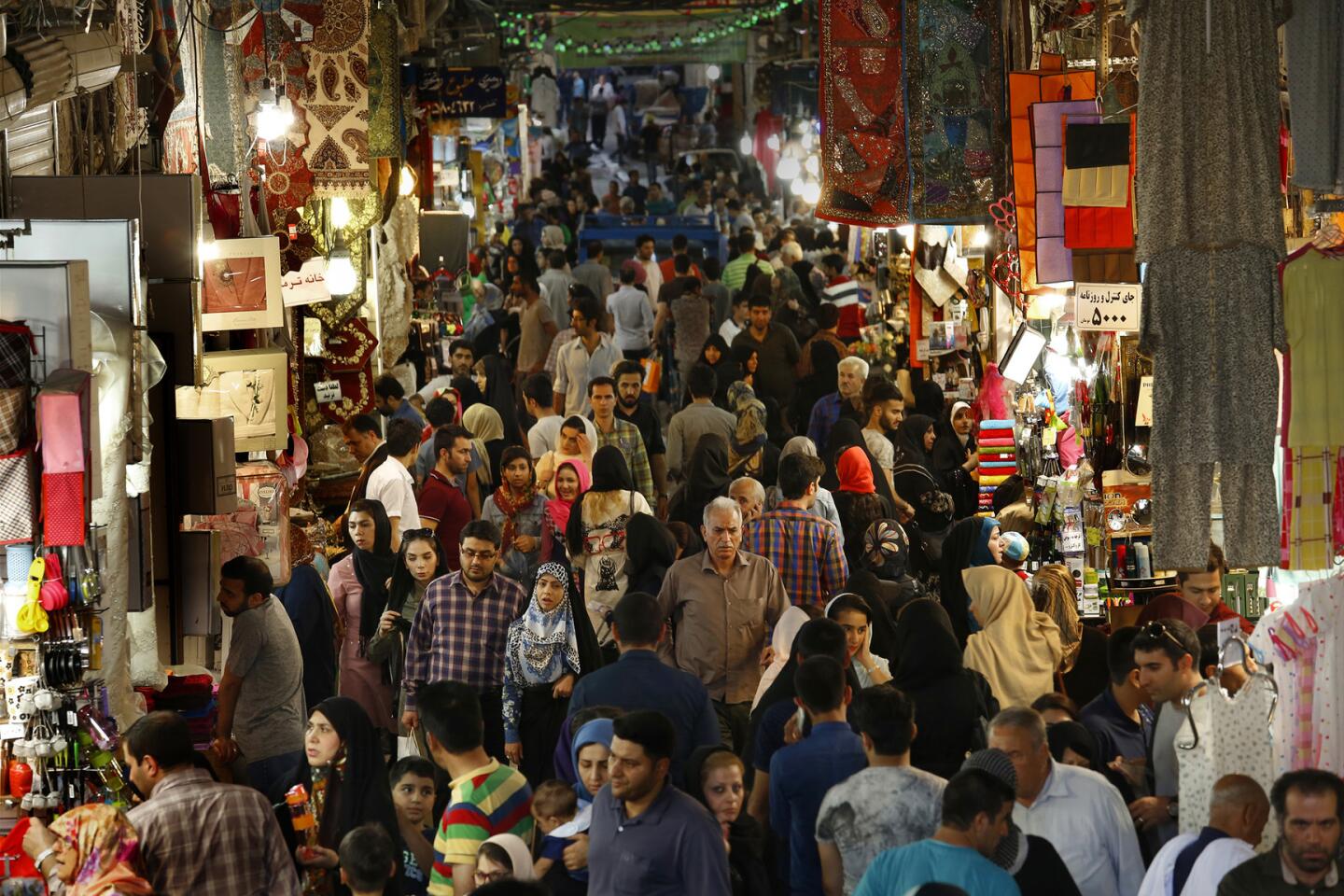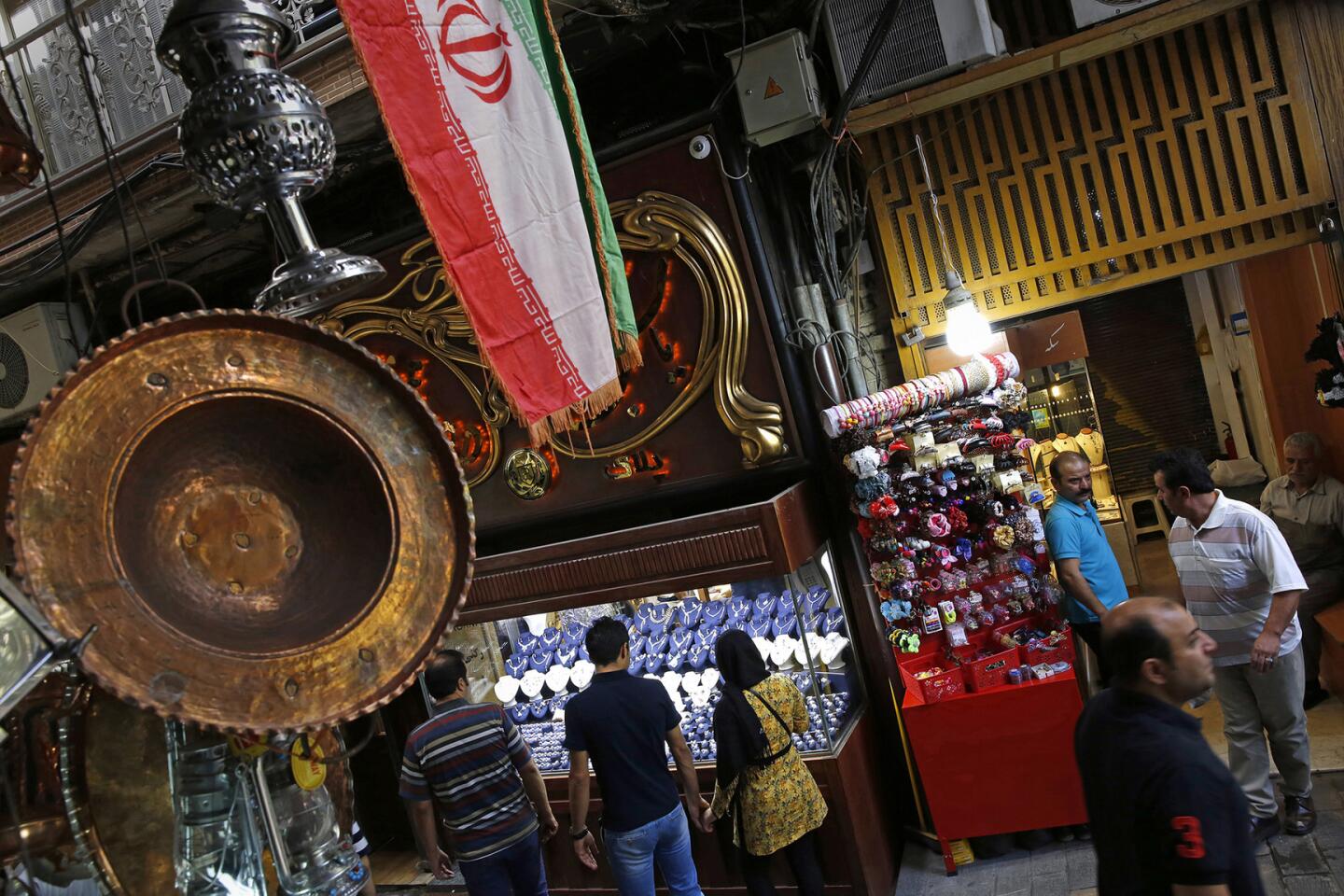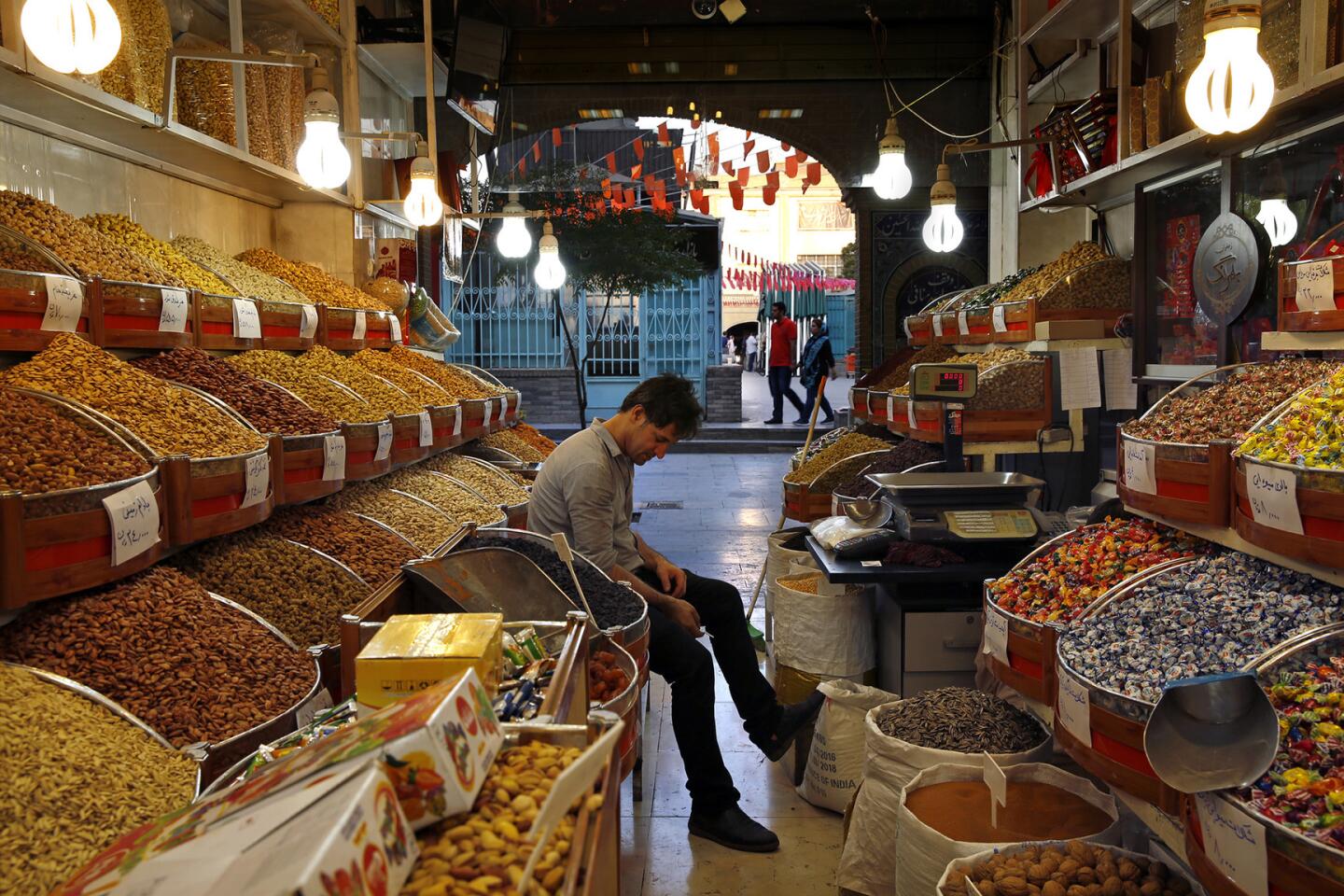‘We thought things would get better’: A year after the nuclear deal, Iranians await economic recovery
Reporting from Tehran — Eight months after international sanctions were lifted in exchange for curbs on its nuclear program, Iran’s long-suffering people are still waiting for change.
President Hassan Rouhani’s promises of new jobs and greater incomes haven’t been met. Foreign investment has been slow to materialize. Prices of basic goods continue to rise, a reliable marker of misery in an economy struggling to reconnect to the outside world.
Under the arched, sky-lit passageways of Tehran’s centuries-old grand bazaar, where shoppers lingered at display windows and laborers pushed handcarts piled high with Iranian-made shoes and housewares, many shared a similar lament.
“Since the sanctions were lifted, things have become even worse,” Behnaz Abbasi, a 26-year-old accountant, said while browsing a cramped shop stacked with dusty local carpets.
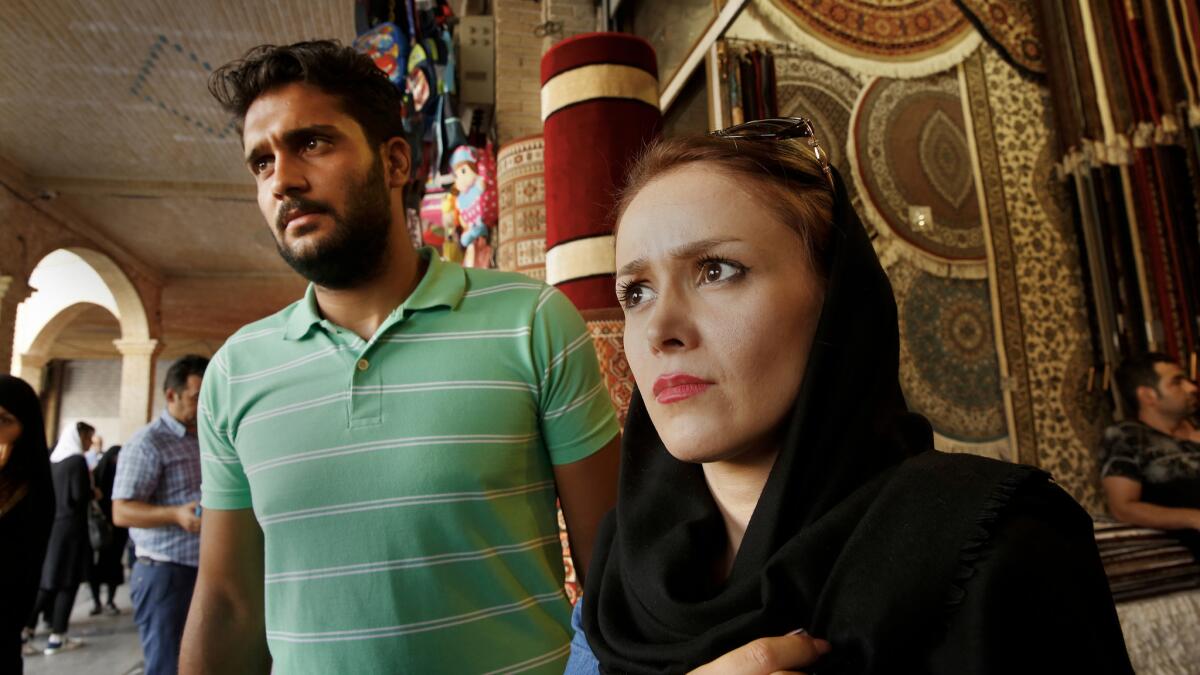
Abbasi and her fiancé, an electrical contractor, said prices for meat and some vegetables had doubled over the last two years. Even with both their salaries, they could barely afford the $300 monthly rent in the small apartment they will share in blue-collar east Tehran.
“We thought things would get better,” she said, “but for us it’s as if the deal never happened.”
Many blame the United States, which has lifted nuclear-related sanctions but left in place other financial restrictions on Iran due to its support for terrorism and development of ballistic missiles. That has scared away foreign investors, including many European and Asian companies wary of running afoul of U.S. laws, leading Tehran to accuse Washington of violating the spirit of the nuclear deal.
Iran is still barred from the U.S. financial system, meaning it cannot do business in dollars — the primary currency for oil sales and most other international trade. The Obama administration has been weighing whether to allow Iran limited access to dollars, a move that Republicans and some Democrats in Congress oppose.
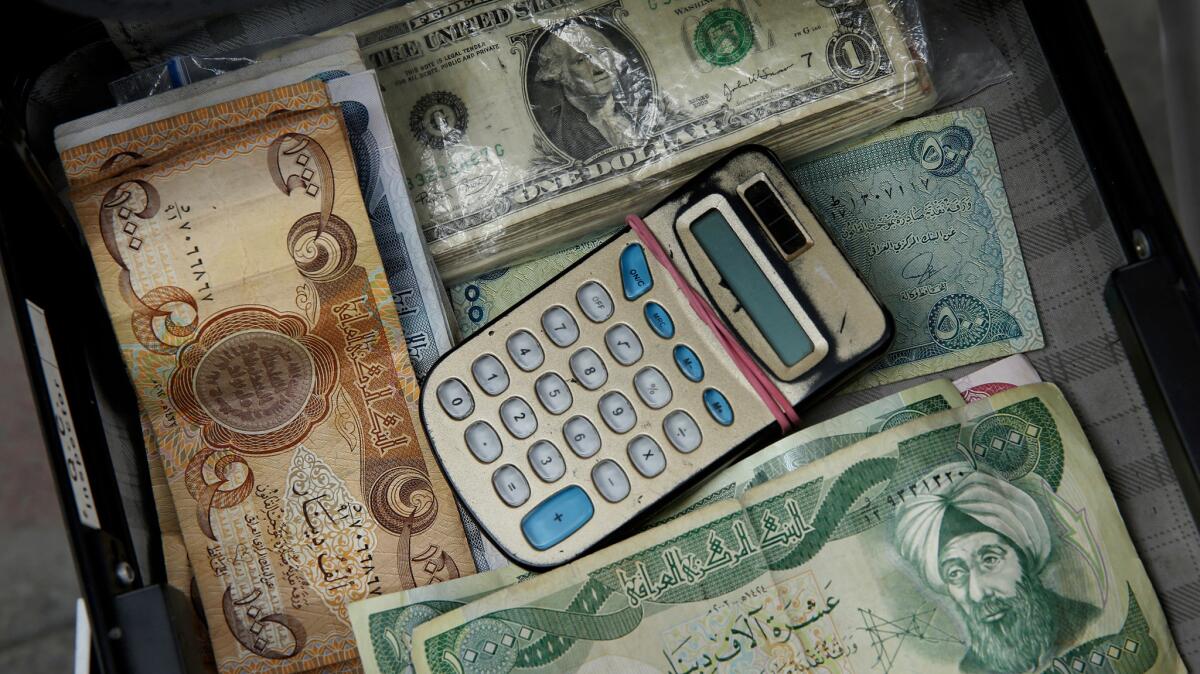
Across the drab concrete sprawl of Tehran, there is little sign of the tens of millions of dollars in Iranian oil revenue that were due to be released after being frozen in overseas banks due to sanctions. Nor have Iranian officials disclosed what they did with a planeload of $400 million in cash the U.S. delivered in January — part of $1.7 billion Washington owes Tehran for canceling an arms sale following the 1979 Islamic revolution.
Some analysts in Tehran believe the government spent a substantial portion of the funds to pay down debt, particularly in the overheated construction sector where elites stashed their wealth.
In any case, visible investment is scant. Some Iranians fault Rouhani’s government for raising unrealistic expectations that the economy could be turned around quickly; others blame hard-liners who control major industries and want the agreement to collapse.
Amir Khaledi, who owns a kiosk selling Iranian-made shoes and sandals, said he supported Rouhani’s nuclear diplomacy as a way to avert conflict with the United States and end Iran’s long estrangement with the West.
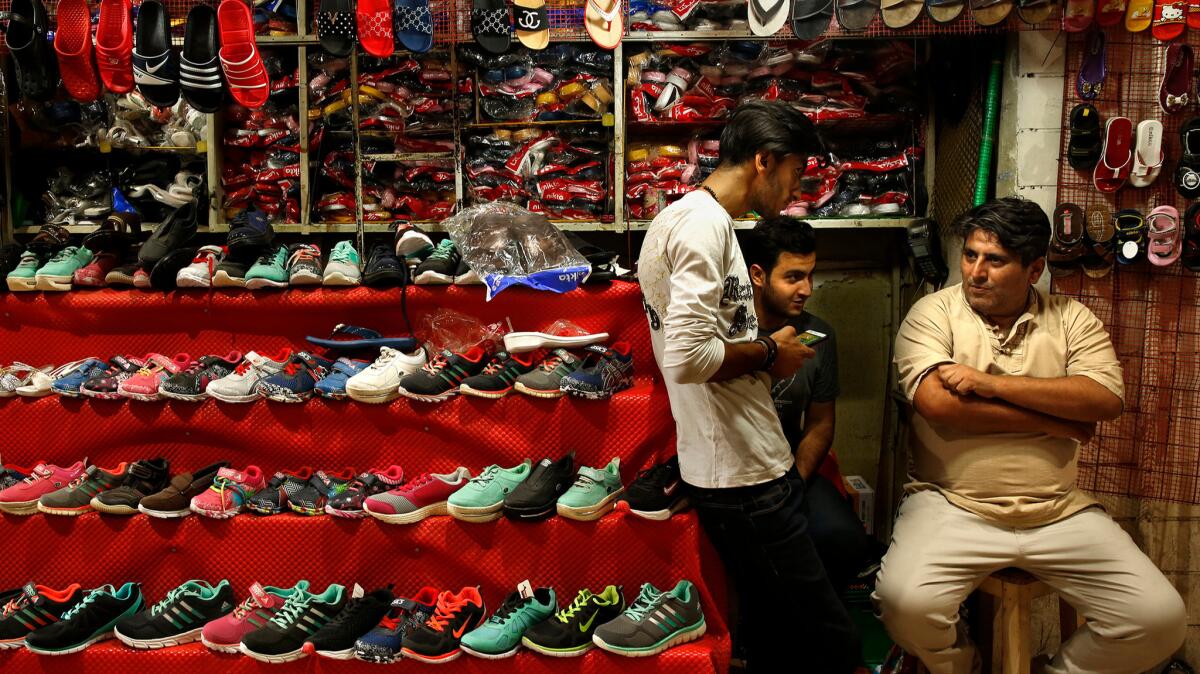
After the deal was struck in July 2015, he eagerly followed the news as foreign delegations swept into Tehran and pledged to invest. He began to imagine American- and European-made goods lining his shelves.
Since sanctions were formally lifted in January, those hopes have dimmed.
“The White House always said, ‘If Iran cooperates…’” said Khaledi, 40. “Well, Iran has done everything and the commitments have not been fulfilled.”
The most powerful figure in Iran’s theocracy, Ayatollah Ali Khamenei, has begun to distance himself from the agreement.
Known as the supreme leader, Khamenei surprised followers when he endorsed negotiations with the United States and five other countries to end Iran’s uranium enrichment program, which the West feared could be a precursor to a nuclear weapon.
In a speech this month, Khamenei said the deal has brought “no concrete or distinct impact on people’s lives” and “these unjust sanctions…haven’t been removed.”
Obama administration officials hoped the agreement would help open up future talks with Iran over its support for Syrian President Bashar Assad, the Lebanese militant group Hezbollah and other groups that threaten U.S. interests in the Middle East.
But this month, Rouhani told state television, “Had the Americans implemented the [nuclear deal] in good faith, we might have placed trust in them and agreed to enter into negotiations with them other issues.” His comments were preceded by a propaganda clip that suggested Iran “burn down” the nuclear deal.
See why the Obama administration says the Iran nuclear deal helped create ‘a safer world’ »
Rouhani could be seeking to mollify hard-liners, a departure for the moderate, soft-spoken cleric whose 2013 election Western leaders greeted as a welcome change after eight years of the combative arch-conservative Mahmoud Ahmadinejad.
Rumors now swirl in Tehran that Ahmadinejad – or another conservative opposed to rapprochement with the U.S. – could challenge Rouhani, who is up for reelection next June.
“For sure, the next president of Iran will be anti-American,” said theology teacher Hadi Panahian, 29. “It’s impossible for Rouhani to be reelected.”
Panahian, whose brother is an influential conservative cleric, said the lifting of sanctions could be “a blessing in disguise” because it revealed U.S. duplicity.
“I try to talk respectfully about my government, but [Rouhani] built a house on water and it has already sunk…. This generation and the generation to come have to be reminded that we cannot trust America.”
Fortunately for Rouhani, he still seems to have support among Iran’s urban middle class, which stands to gain the most from improved relations with the rest of the world. Those voters propelled moderate candidates to a strong showing in parliamentary elections earlier this year, and many still back Rouhani despite their disappointment.
“The government was not ill-intentioned,” said Ali Rezaei, 36, co-owner of a dried fruit shop. “They wanted to give hope to the people after so many years. That’s why people’s expectations were so high, and why they haven’t been met.”
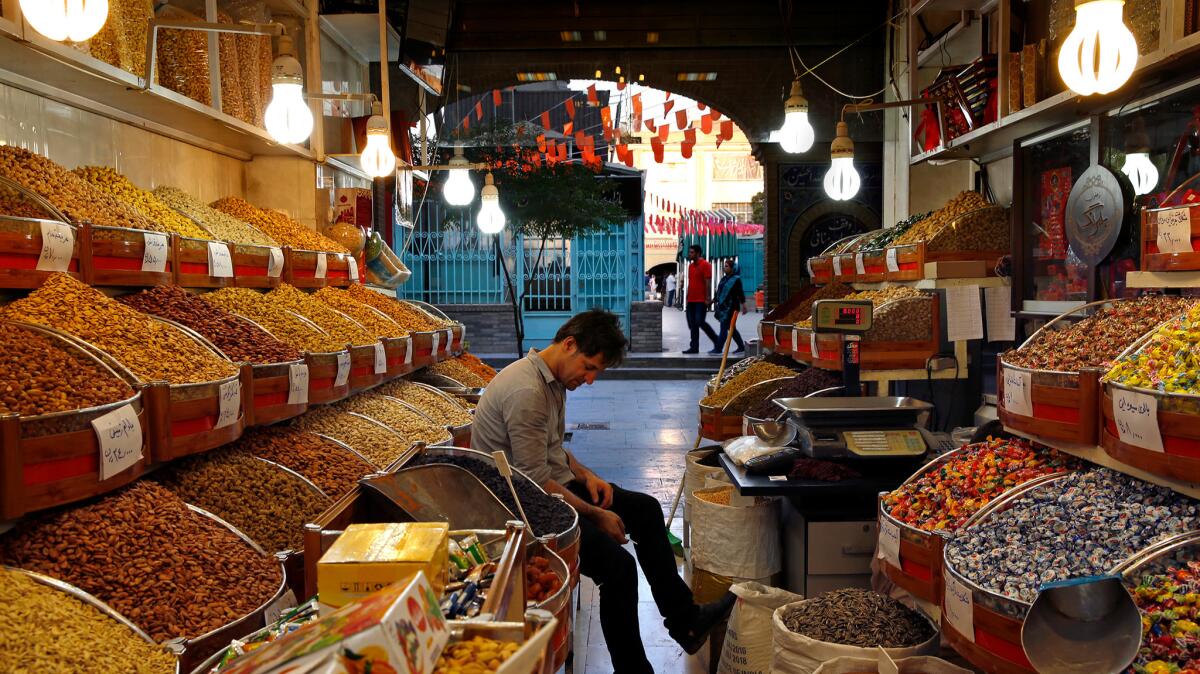
“Death to America” chants are still de rigeur at weekly prayers in Tehran, but after a recent Friday sermon, worshipers streaming out of the ornate Mosalla Mosque signaled growing frustration at corruption among Iran’s political elite.
“Down with the robbers of the public treasury,” dozens chanted – a reference to recent revelations that senior officials at public companies were pocketing exorbitant salaries while employees’ wages have stayed flat.
The official unemployment rate is 11%, but experts believe as many as half of university graduates are jobless.
“We see the young people leaving to go overseas. We see the fiasco over salaries,” said Maryam Sheikha, 74, a retired theology teacher. “One agreement cannot fix our problems. It’s like trying to fill the sea a handful of water at a time.”
One agreement cannot fix our problems. It’s like trying to fill the sea a handful of water at a time.
— Maryam Sheikha, 74, on the Iran nuclear deal
For middle-class Iranians, signs of struggle are often subtle. Parks grow crowded in the evenings as people forego gym memberships. Fast-food joints hawking $1 falafel sandwiches are proliferating, with chicken and red meat proving too costly.
Inside his narrow jewelry shop selling silver rings studded with bright stones, Hamid Kavosi said the U.S. hadn’t lived up to its promises. He worried about his daughter, 27, a chemistry graduate who can’t find a job.
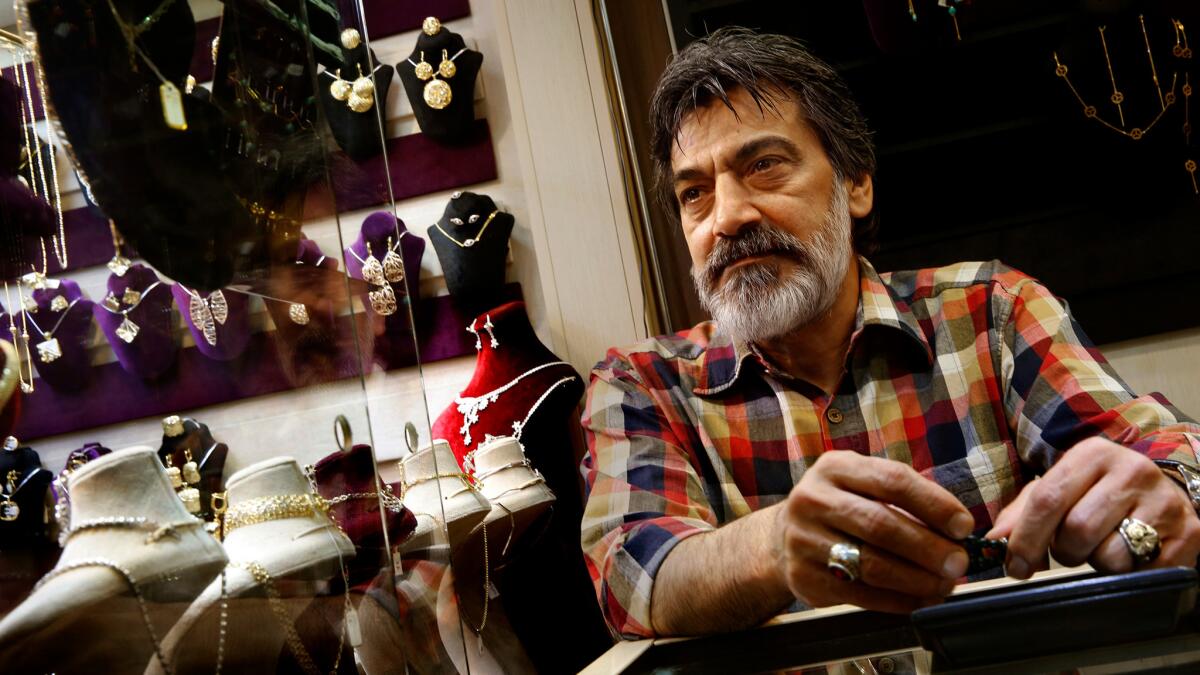
“If we were integrated in the international economy, we could find enough jobs for our youth,” said Kavosi, 56. “For my daughter, a job is part of her identity. I can afford to support her but she deserves to have a decent life.”
Still, Kavosi added, “I supported the nuclear negotiations and I still support Rouhani. Peace with the United States is better than war.”
Special correspondent Ramin Mostaghim contributed to this report.
Follow @SBengali on Twitter
MORE WORLD NEWS
Liberia must learn to honor the rights of rural residents to manage their own land
Iran judiciary confirms member of negotiation team arrested
China once struggled to feed its people. Now it’s seeing a rise in eating disorders
More to Read
Sign up for Essential California
The most important California stories and recommendations in your inbox every morning.
You may occasionally receive promotional content from the Los Angeles Times.
